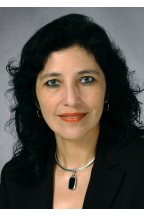Patricia Nieva

Contact information
Website
https://uwaterloo.ca/sensors-integrated-microsystems-lab/Biography summary
Patricia Nieva is a Professor in the Department of Mechanical and Mechatronics Engineering at the University of Waterloo.
She is an expert in micro- and nano- technologies and in particular, the development of microsensors, nanosensors and integrated sensor system solutions. She has established a multidisciplinary research program that aims to build novel sensing methodologies to enhance vehicle safety and performance, as well as point-of-care health monitoring and medical diagnosis. The focus of her work is on chemical and biological photonic sensing technologies involving fiber optics and nanostructured plasmonic devices, as well as high-temperature MEMS (Micro-Electro-Mechanical Systems) capacitive, infrared and interferometric sensing technologies. Her work also spans reliability studies of microsystems, in-situ characterization of material properties of thin films, and the manufacturing of metallic nanoparticles for sensing applications. Professor Nieva is also recently involved in a project to build a handheld cardiac monitor that will measure proteins in the blood commonly linked to a heart attack, alerting the patient’s doctor before symptoms appear.
Her ongoing research work constitutes an important commitment to the identification of simple, cost-effective and reliable micro- and nano- technologies for advanced sensing. Professor Nieva’s research has led to 2 patents (one awarded and one provisional). She has authored and co-authored more than 90 journal and conference publications, and is also a member of the Institute of Electrical and Electronic Engineers (IEEE), the American Society of Mechanical Engineers (ASME) and the Phi Kappa Phi Honor Society.
Research interests
- Multifunctional MEMS/NEMS & MOEMS Sensors
- MEMS/NEMS Reliability
- MEMS Optical Interferometry
- Integrated Microsystems
- Biomechanics and Biotechnology
- Microfluidic Based Sensors
- Automotive
- MEMS materials and functionalization
- Nanotechnology
- Mechatronics
- Hybrid and electric vehicles
- Wearable technology
- Energy storage
- Sensors and devices
- Nano-biosystems
- Nano-electronics
- Nano-materials
- MEMS/NEMS sensor systems and packaging for harsh environments
Education
- 2004, Doctorate, Electrical Engineering, Northeastern University, Boston Massachusetts
- 1999, Master's, Mechanical Engineering, Northeastern University, Boston Massachussets
- 1987, Bachelor's, Mechanical and Electrical Engineering, National University of Engineering, Lima
Courses*
- MTE 203 - Advanced Calculus
- Taught in 2021, 2022, 2024, 2025
- MTE 545 - Introduction to MEMS Fabrication
- Taught in 2021, 2022, 2025
* Only courses taught in the past 5 years are displayed.
Selected/recent publications
- Sohi, Ali Najafi and Nieva, Patricia M, Frequency response of curved bilayer microcantilevers with applications to surface stress measurement, Journal of Applied Physics, 119(4), 2016
- Ghannoum, AbdulRahman and Norris, Ryan C and Iyer, Krishna and Zdravkova, Liliana and Yu, Aiping and Nieva, Patricia M, Optical Characterization of Commercial Lithiated Graphite Battery Electrodes and In Situ Fiber Optic Evanescent Wave Spectroscopy, ACS Applied Materials & Interfaces, 2016
- Asiaei, Sasan and Nieva, Patricia M, Studying the kinetics of thiols’ self-assembled monolayer formation in microfluidic channels, Particulate Science and Technology, 2015, 1 - 10
- Sohi, Ali Najafi and Nieva, Patricia M and Khajepour, Amir, Electrothermomechanical modeling of out-of-plane deformation in single-stepped beams actuated by resistive heating, Journal of Micromechanics and Microengineering, 25(3), 2015
- Asiaei, Sasan and Smith, Brendan and Nieva, Patricia, Enhancing conjugation rate of antibodies to carboxylates: Numerical modeling of conjugation kinetics in microfluidic channels and characterization of chemical over-exposure in conventional protocols by quartz crystal microbalance, Biomicrofluidics, 9(6), 2015
In the news
- COVID-19 tracing system receives provincial funding boost
- Airline to pilot Waterloo contact tracing tech for COVID
- New AI technology will be used to improve contact tracing for COVID-19
Graduate studies
- Currently considering applications from graduate students. A completed online application is required for admission; start the application process now.